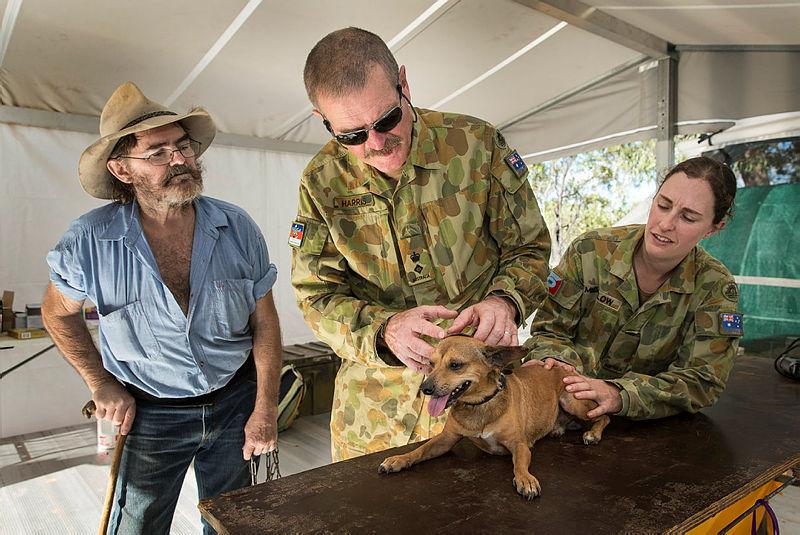
Sea state
Japan will increase its involvement in Exercise Talisman Sabre, which begins this month, as the country aims to strengthen its presence in Asia and the western Pacific. The Japan Maritime Self-Defense Force helicopter destroyer JS Ise and tank landing ship JS Kunisaki will join what’s traditionally been an Australia–US exercise along with troops from the Japan Ground Self-Defense Force’s new amphibious brigade. This will be Japan’s third and largest engagement in the exercise, which focuses on amphibious, airborne and naval combat operations.
President Rodrigo Duterte is continuing to face domestic criticism over his response to the sinking of a Philippine fishing boat by a Chinese vessel in the South China Sea. Duterte has described the sinking on 9 June as ‘just a collision’ and an isolated incident. The 22 fishermen on board the boat were left stranded at sea by the Chinese vessel and were rescued by a passing Vietnamese boat.
The amphibious assault ship USS Wasp has struggled to connect the ship’s main gangway to the wharf in Sydney’s Garden Island ahead of Talisman Sabre. ‘American ingenuity and Aussie knowhow’ eventually brought the US personnel to shore using cranes, ropes and teams of seamen.
Flight path
Two Dutch F-35As have flown a 9,000-kilometre rapid reaction test mission from Edwards Air Force Base in the US to Vlieland Bombing Range in the Netherlands. The long-range bombing mission was conducted at short notice and was part of the aircraft’s operational testing and evaluation phase for the Royal Netherlands Air Force. The aircraft had to land and wait in Canada before completing its mission because of issues with the Netherlands’ KDC-10 fuel tanker.
Three B-52H bombers from the US Air Force’s 5th Bomber Wing were intercepted by Russian Su-27 Flanker aircraft over the Baltic and Black seas. The bombers appeared to be on mock strike missions— one flew directly towards the Russian-held Crimean Peninsula. Although the intercepts occurred without incident, bomber flights near Crimea show an increasing willingness on behalf of the US to test Russia’s defence of the peninsula.
Airbus has been chosen to install and certify a directed infrared countermeasures system on the German Air Force’s fleet of A400M transport aircraft. The system, developed by Elbit Systems in Israel, uses lasers and thermal cameras to detect and deflect heat-seeking, infra-red ground-to-air missiles for medium and large aircraft like the A400M. Other versions are available for helicopters and smaller turboprop aircraft.
Rapid fire
New figures have revealed that more than 100 British Army instructors have been accused of offences, including fighting, stealing and the abuse of recruits involving ‘hazing’ over the past four years. The army chief, General Sir Mark Carleton-Smith, said ‘all these allegations are being taken very seriously’ and ‘are now under active investigation by the police’.
The US Army is retrofitting surface-to-air Stinger missiles with proximity fuses. Detonating a missile’s warhead near the target will allow it to take down smaller aircraft like drones. In an April 2017 test, a retrofitted Stinger successfully destroyed two unmanned aerial systems. The army expects to be able to deploy the missiles by the end of the year.
Australian Army veterinarians have provided a week of free animal care in the Western Australian town of Jigalong as part of the Army Aboriginal Community Assistance Programme. The army is also building a new multi-purpose structure and BBQ area in the community. The program is run every year by the army to improve health and living conditions in remote communities.
Final frontier
NASA is set to trial a deep space atomic clock, a crucial step in advancing future space navigation. The new clock is much smaller than previous atomic clocks, meaning it can be carried on spacecraft. The clock will allow spacecraft to operate with much more precision while navigating. A prototype will launch this week and the trial will run for a year.
SpaceX has successfully completed its final static-fire test for its Falcon Heavy rocket before lift-off this week at NASA’s Kennedy Space Center. While the Falcon Heavy has flown before, this is the first time it will launch more than one satellite.
The German space agency has sent an X-ray telescope known as eROSITA out across the universe to search for dark energy. The telescope’s aboard a Russian Proton rocket and, among other tasks, it will track and examine X-ray emissions from galaxy clusters and attempt to better understand dark energy and the role it plays in the expansion of the universe.
Wired watchtower
Plans to record the computer screens of staff at the Department of Human Services while they conduct customer phone calls have increased the concerns of Australia’s main public sector union over privacy and data security. The department has been trialling screen recordings of 600 staff, but it hasn’t let customers know that video as well as audio recordings are being made.
Myanmar’s transport and communications ministry has ordered telecommunications companies to suspend internet services in Rakhine and Chin states. No information has been provided by local authorities as to what influenced the government’s decision, but efforts to control access to online information have been increasing in the country. In February, Facebook attempted to shut down propaganda from armed groups to prevent further violence.
Microsoft has banned its employees from using the free version of the workplace messaging tool Slack and grammar-checking app Grammarly. The company has also discouraged the use of Amazon Web Services and Google Docs. Microsoft cited security concerns as the reason for the ban.